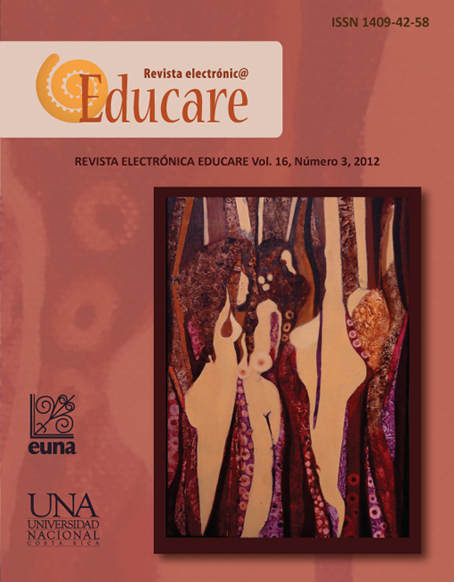Competencies Required in Education Research and Teaching Systematization according to Students from the Preschool, Primary and Secondary Education Programs of the University of Costa Rica
DOI:
https://doi.org/10.15359/ree.16-3.4Keywords:
Research, Educational Research, Competencies, Systematization, Student Perceptions, university training.Abstract
The purpose of this paper is to present the results of two online forums carried out with the participation of 42 students of the Licenciaturas in Preschool Education, Primary Education and Secondary Education of the University of Costa Rica. The main purpose of the forums was to determine the insights of the participant students about the competencies they have achieved in the field of education research, and which have been the essential tools for them to systematize their own teaching practices. The discussion forums were part of the course FD5091 Métodos de Investigación Educativa [Education Research Methods] of the School of Teacher Education, delivered from March-April 2010. Of the sample, 60 percent were students of the Preschool teaching program, 35 percent were from the Primary Education teaching program and 5 percent were from the Secondary Education teaching program in the fields of Science, Mathematics and Social Studies. According to the insights and beliefs showed by the participants –both, the future teachers and the profession practitioners–, there are no opportunities for research or systematization of their own teaching mediation, in the current work situation.
(1) Translator’s Note: In Costa Rica, the “Licenciatura” is a one-year post-Bachelor study program, usually including thesis. “Primary Education” refers to students from the 1st to 6th grades, and “Secondary Education” refers to students from the 7th to 11th grades.
References
Álvarez, J. M. (1986). Introducción a la edición española: Investigación cuantitativa/investigación
cualitativa: ¿Una falsa disyuntiva? En T. D. Cook y C. S. Reichardt (Eds.), Métodos cualitativos
y cuantitativos en investigación evaluativa (pp. 9-24). España: Morata.
Anguiano, A. M., López, S., Plascencia C., Jiménez, S., Perea, M. B. y Calvo, A. L. (verano, 2009).
Reflexionar sobre la sistematización; una preocupación del profesional de Trabajo Social.
Margen, 52. http://www.margen.org/suscri/margen52/anguian.html
Ayllón, M. R. (2002). Una propuesta operativa para sistematizar. Aprendiendo desde la práctica.
Lima: Asociación Kallpa.
Braslavsky C., Acosta, F. y Jabif, L. (2004). Orientaciones conceptuales y didácticas. Buenos Aires:
IIPE-UNESCO.
Céspedes, J. y Castro, D. (junio, 2010). El docente como investigador de su quehacer en Costa
Rica. Patria Grande. Revista Centroamericana de Educación, 1(1), 1-23. Recuperado de
http://www.estrategiaol.com/revista/index.php/patria_grande/article/viewFile/1/4
Gelb, M. J. (1999). Inteligencia genial. 7 principios claves para desarrollar la inteligencia, inspirados
en la ida y obra de Leonardo da Vinci. Bogotá: Norma.
Kisnerman, N., y Mustieles D. (1997). Sistematización de la práctica con grupos. Buenos Aires:
Lumen Humanitas.
Sandoval, A. (2001). Propuesta metodológica para sistematizar la práctica profesional del trabajo
social. Buenos Aires: Espacio Editorial.
Segura, M. (16 de marzo-6 de abril de 2010). Re: Acerca de las oportunidades que se tiene
en el sistema educativo de realizar un proceso de investigación que permita formarme
con competencias en dicho campo. [Foro en línea] Curso FD5091- Métodos y Técnicas de Investigación Educativa. Escuela de Formación Docente. Universidad de Costa Rica.
Recuperado de y
Universidad de Costa Rica, Facultad de Educación, Escuela de Formación Docente (2008).
FD-0545-Investigación para el mejoramiento del aprendizaje (Programa del curso). San José:
Autor.
Downloads
Published
How to Cite
Issue
Section
License
1. In case the submitted paper is accepted for publication, the author(s) FREELY, COSTLESS, EXCLUSIVELY AND FOR AN INDEFINITE TERM transfer copyrights and patrimonial rights to Universidad Nacional (UNA, Costa Rica). For more details check the Originality Statement and Copyright Transfer Agreement
2. REUTILIZATION RIGHTS: UNA authorizes authors to use, for any purpose (among them selfarchiving or autoarchiving) and to publish in the Internet in any electronic site, the paper´'s final version, both approved and published (post print), as long as it is done with a non commercial purpose, does not generate derivates without previous consentment and recognizes both publisher's name and authorship.
3. The submission and possible publication of the paper in the Educare Electronic Journal is ruled by the Journal’s editorial policies, the institutional rules of Universidad Nacional and the laws of the Republic of Costa Rica. Additionally, any possible difference of opinion or future dispute shall be settled in accordance with the mechanisms of Alternative Dispute Resolution and the Costa Rican Jurisdiction.
4. In all cases, it is understood that the opinions issued are those of the authors and do not necessarily reflect the position and opinion of Educare, CIDE or Universidad Nacional, Costa Rica. It is also understood that, in the exercise of academic freedom, the authors have carried out a rogorous scientific-academic process of research, reflection and argumentation thar lays within the thematic scope of interest of the Journal.
5. The papers published by Educare Electronic Journal use a Creative Commons License:














 The articles published by Educare Electronic Journal can be shared with a Creative Commons License:
The articles published by Educare Electronic Journal can be shared with a Creative Commons License: 



